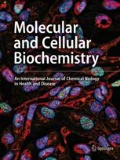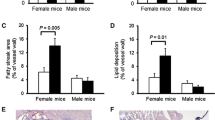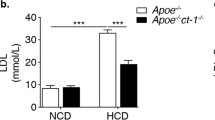Abstract
Both the aorta and the liver are major organs that play important roles in lipid metabolism, and they are subject to systemic as well as local inflammatory responses in metabolic syndrome. Our previous study indicated that TNFα deficiency influences atherogenesis by reducing inflammation of the aorta. To better understand this phenomenon, the mRNA and protein expression profiles of a panel of cytokines in the aorta and liver of young TNFα-null (TNFα−/−) mice were analyzed and compared with age- and gender-matched wild-type (WT) control mice. In the aorta, IL-2 and GM-CSF were up-regulated versus WT mice, while IL-1β, IL-4, IL-6, IL-10, MCP-1, IFN-γ, and the adhesion molecules ICAM-1 and VCAM-1 were down-regulated. In the liver, however, the expressions of NF-κB, IL-1, IL-2, IL-6, IL-10, ICAM-1, and VCAM-1 were significantly up-regulated in TNFα−/− mice, while IFN-γ and IL-4 were down-regulated. Out of the 62 cytokines analyzed, 22 in the aorta and 27 in the liver were altered by 2–fivefolds at the protein level in TNFα−/− mice. Our data demonstrated that the loss of TNFα function led to various changes in the levels of cytokine expression in these organs at both the transcriptional and translational levels. These results indicated that the changes in cytokine expression patterns in the aorta and the liver may further influence the progression of systemic or local lipid metabolism dysregulation and pathogenesis in animals with TNFα dysfunction representing inflammation-related diseases, such as atherosclerosis and metabolic syndrome.



Similar content being viewed by others
Abbreviations
- IL:
-
Interleukin
- GM-CSF:
-
Colony stimulating factor
- MCP-1:
-
Monocyte chemoattractant protein-1
- IFN-γ:
-
Interferon-gamma
- ICAM-1:
-
Intercellular adhesion molecule-1
- VCAM-1:
-
Vascular cell adhesion molecule-1
References
Dinarello CA (2000) Proinflammatory cytokines. Chest 118:503–508
Tedgui A, Mallat Z (2006) Cytokines in atherosclerosis: pathogenic and regulatory pathways. Physiol Rev 86:515–581
Popa C, Netea MG, van Riel PL et al (2007) The role of TNF-alpha in chronic inflammatory conditions, intermediary metabolism, and cardiovascular risk. J Lipid Res 48:751–762
Ohta H, Wada H, Niwa T et al (2005) Disruption of tumor necrosis factor-alpha gene diminishes the development of atherosclerosis in ApoE-deficient mice. Atherosclerosis 180:11–17
Marino MW, Dunn A, Grail D et al (1997) Characterization of tumor necrosis factor-deficient mice. Proc Natl Acad Sci USA 94:8093–8098
Pasparakis M, Alexopoulou L, Episkopou V et al (1996) Immune and inflammatory responses in TNF alpha-deficient mice: a critical requirement for TNF alpha in the formation of primary B cell follicles, follicular dendritic cell networks and germinal centers, and in the maturation of the humoral immune response. J Exp Med 184:1397–1411
Xiao N, Yin M, Zhang L et al (2009) Tumor necrosis factor-alpha deficiency retards early fatty-streak lesion by influencing the expression of inflammatory factors in apoE-null mice. Mol Genet Metab 96:239–244
Bullo′ M, Garcı′a-Lorda P, Megias I et al (2003) Systemic inflammation, adipose tissue tumor necrosis factor, and leptin expression. Obes Res 11:525–531
Diamant M, Lamb HJ, van de Ree MA et al (2005) The association between abdominal visceral fat and carotid stiffness is mediated by circulating inflammatory markers in uncomplicated type 2 diabetes. J Clin Endocrinol Metab 90(3):1495–1501
Bruun JM, Lihn AS, Verdich C et al (2003) Regulation of adiponectin by adipose tissue-derived cytokines: in vivo and in vitro investigations in humans. Am J Physiol Endocrinol Metab 285:E527–E533
Hotamisligil GS, Shargill NS, Spiegelman BM (1993) Adipose expression of tumour necrosis factor-alpha: direct role in obesity induced inflammation. Science 259:87–91
Sonnenberg GE, Krakower GR et al (2004) A novel pathway to the manifestations of metabolic syndrome. Obes Res 12(2):180–186
Xydakis AM, Case CC, Jones PH (2004) Adiponectin, inflammation, and the expression of the metabolic syndrome in obese individuals: the impact of rapid weight loss through caloric restriction. J Clin Endocrinol Metab 89:2697–2703
Porter MH, Cutchins A, Fine JB et al (2002) Effects of TNFa on glucose metabolism and lipolysis in adipose tissue and isolated fat-cell preparations. J Lab Clin Med 139:140–146
Rask-Madsen C, Dominguez H, Ihlemann N et al (2003) Tumour necrosis factor-alpha inhibits insulin’s stimulating effect on glucose uptake and endothelium-dependent vasodilation in humans. Circulation 108(15):1815–1821
Bernstein LE, Berry J, Kim S (2006) Effects of etanercept in patients with the metabolic syndrome. Arch Intern Med 166:902–908
Lo J, L Bernstein E, Canavan B et al (2007) Effects of TNF-a neutralization on adipocytokines and skeletal muscle adiposity in the metabolic syndrome. Am J Physiol Endocrinol Metab 293: E102–E109
Canault M, Peiretti F, Mueller C et al (2004) Exclusive expression of transmembrane TNF-alpha in mice reduces the inflammatory response in early lipid lesions of aortic sinus. Atherosclerosis 172:211–218
Branen L, Hovgaard L, Nitulescu M et al (2004) Inhibition of tumor necrosis factor-alpha reduces atherosclerosis in apolipoprotein E knockout mice. Arterioscler Thromb Vasc Biol 24:2137–2142
Ali K, Middleton M, Pure E et al (2005) Apolipoprotein E suppresses the type I inflammatory response in vivo. Circ Res 97:922–927
Fan J, Heller NM, Gorospe M et al (2005) The role of post-transcriptional regulation in chemokine gene expression in inflammation and allergy. Eur Respir J 26:933–947
Montecucco F, Steffens S, Burger F et al (2008) Tumor necrosis factor-alpha (TNF-alpha) induces integrin CD11b/CD18 (Mac-1) up-regulation and migration to the CC chemokine CCL3 (MIP-1 alpha) on human neutrophils through defined signaling pathways. Cell Signal 20:557–568
Elizur A, Adair-Kirk TL, Kelley DG et al (2008) Tumor necrosis factor-alpha from macrophages enhances LPS-induced clara cell expression of keratinocyte-derived chemokine. Am J Respir Cell Mol Biol 38:8–15
Lin SK, Kok SH, Shun CT et al (2007) Tumor necrosis factor-alpha stimulates the expression of C–C chemokine ligand 2 gene in fibroblasts from the human nasal polyp through the pathways of mitogen-activated protein kinase. Am J Rhinol 21:251–255
McCormack G, Moriarty D, O’Donoghue DP et al (2001) Tissue cytokine and chemokine expression in inflammatory bowel disease. Inflamm Res 50:491–495
Kulbe H, Hagemann T, Szlosarek PW et al (2005) The inflammatory cytokine tumor necrosis factor-alpha regulates chemokine receptor expression on ovarian cancer cells. Cancer Res 65:10355–10362
Odaka M, Matsukura S, Kuga H et al (2007) Differential regulation of chemokine expression by Th1 and Th2 cytokines and mechanisms of eotaxin/CCL-11 expression in human airway smooth muscle cells. Int Arch Allergy Immunol 143:84–88
Khovidhunkit W, Kim MS, Memon RA et al (2004) Effects of infection and inflammation on lipid and lipoprotein metabolism: mechanisms and consequences to the host. J Lipid Res 45:1169–1196
Fan CY, Pan J, Usuda N et al (1998) Steatohepatitis, spontaneous peroxisome proliferation and liver tumors in mice lacking peroxisomal fatty acyl-CoA oxidase. Implications for peroxisome proliferator-activated receptor alpha natural ligand metabolism. J Biol Chem 273:15639–15645
Knolle PA, Gerken G (2000) Local control of the immune response in the liver. Immunol Rev 174:21–34
Acknowledgments
This study was supported in part by grants from the Natural Science Foundation of Shandong (Z2007C05), Science and Technology Projects of Shandong (2008GG10002030) and the Department of Education of Shandong (J06L11) to J. Pan.
Author information
Authors and Affiliations
Corresponding author
Rights and permissions
About this article
Cite this article
Sun, Y., Yin, M., Zhang, L. et al. Characterization of the cytokine expression profiles of the aorta and liver of young tumor necrosis factor alpha mutant mice. Mol Cell Biochem 366, 59–67 (2012). https://doi.org/10.1007/s11010-012-1283-1
Received:
Accepted:
Published:
Issue Date:
DOI: https://doi.org/10.1007/s11010-012-1283-1




